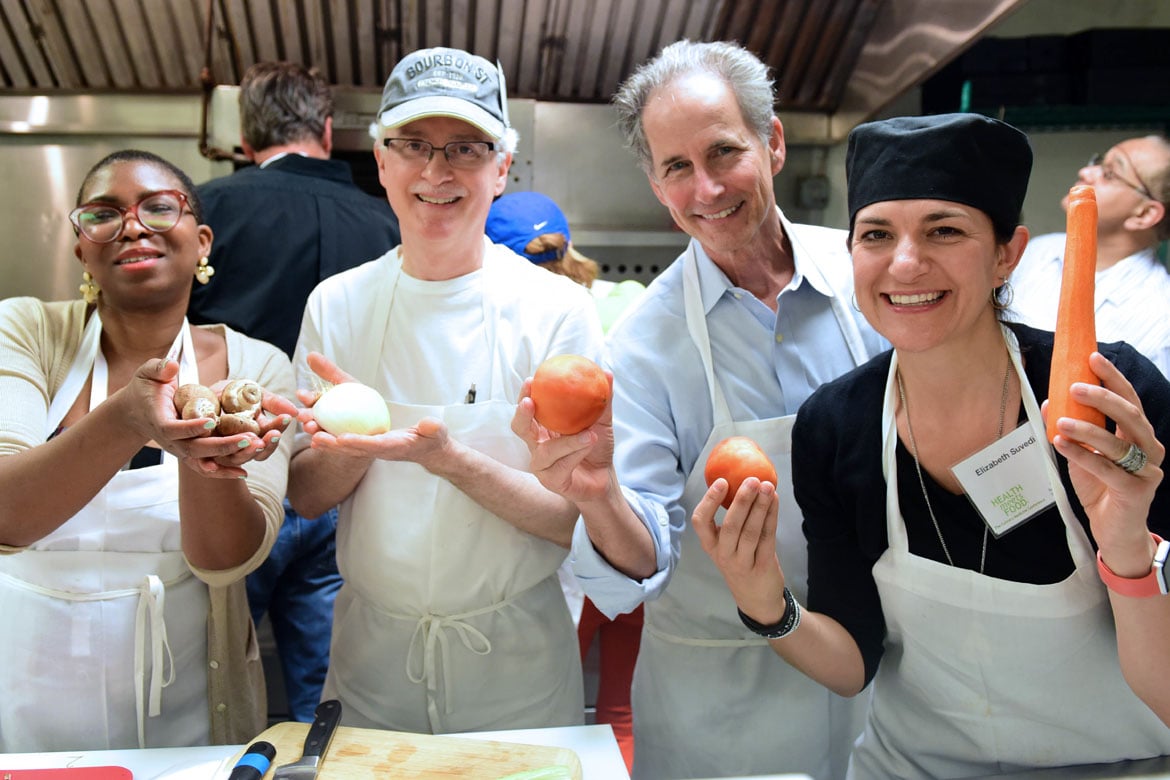Most medical schools are not focused on teaching their students about cooking, but that is starting to change. With the growing importance of lifestyle change in the management of hypertension and other chronic diseases, Tulane University School of Medicine is not only teaching their medical students about nutrition, but how to cook.
Tulane’s medical school was among the first to take on a licensed chef as an instructor with its curriculum developed in partnership with the Johnson & Wales College of Culinary Arts in Providence, Rhode Island. This new path for medical education began eight years ago when Tulane introduced the idea of building a teaching kitchen so medical students can learn how to cook. Since being implemented, the program has been licensed to 35 other medical schools across the country.
But the program is not limited to medical students. It is also open to the New Orleans community.
“It is state-of-the-art programming in that it is inverted classrooms with all the lectures and didactics done online. It’s a combination of that with reading scholarly work and case-based and team-based learning, as well as hands-on cooking and a seminar-style discussion,” Timothy Harlan, MD, told AMA Wire®. Dr. Harlan is an associate professor of medicine at Tulane. He is also the associate dean for clinical services and executive director of the Goldring Center for Culinary Medicine.
This hands-on experience is critical to teaching tomorrow’s physicians what they need to know to help patients make the real-world changes needed to lower their blood pressure or make progress in other lifestyle-amenable chronic diseases.
The evidence shows how doctors can make an impact in patients’ decisions about lifestyle change, Dr. Harlan said.
“If you know a lot about exercise and how you fit that into your life, and you share that information with your patients, the literature is pretty clear. They follow your instructions and they’re more likely to listen to you,” he said. “We believe that knowing about food means you have to know how to cook.”
About 20 percent of the medical schools in the country are using Tulane’s cooking programming, and it is likely to be in 50 sites (including residency programs and nursing schools) by the end of the 2017–2018 academic year.
“We’re seeing a lot of creative things happening at those partner sites across the country,” said Dr. Harlan. “There’s a lot of interdisciplinary work between nursing, dietetics, residents, medical students and the community. That’s really where this offers a very robust experience for the students.”
It’s about food, not diet
The core programming uses Mediterranean diet principles and translates those principles for the American kitchen. It is available for medical students, as well as the surrounding community including children, families, adults, seniors and even professionals. The elective includes eight modules, each one requiring about four hours’ commitment—an hour or more of the online component, followed by three hours in the hands-on component in the kitchen.
Students have been very receptive of the cooking program, with about 20 percent initially involved. About 15 percent of Tulane medical students are taking the elective, but other opportunities have also become available in addition to the elective modules. In the last few years, the program has grown to include another 17 modules that are condition- and disease-specific. These are offered to third- and fourth-year med students.
“For the professional programming, we take all of that stuff that medical students, nursing students learn in the first two years and we translate that into the conversation you will have with your patient in the examination room about food,” Dr. Harlan said. “It’s not about diet or nutrition, certainly not about weight loss, but a focus on the Mediterranean diet principles and the qualities of calories that our patients consume.”
Dr. Harlan said a module that focuses on sodium-potassium renal homeostasis “is the hypertension module.”
“We focus on sodium and potassium because potassium is probably, if not more, important than sodium in control of hypertension,” he said.
Beyond the elective, Tulane’s medical school has a comprehensive course set for third- and fourth-year med students for a 28-day rotation where they help teach first and second year students as well as the community. Every year, 12 students are also sent to Johns & Wales College of Culinary Arts to spend time in the culinary and nutrition program there.
“We teach the students; they teach the community,” said Dr. Harlan. “The whole project now goes well beyond the classroom space as far as what fits in your traditional curriculum.”
Med students at Tulane learn to teach their patients everyday skills in how to cook, what to cook and why it is important. In this program, the students learn to make the most of low-cost ingredients to cater to low-income communities. Cooking classes are also available for continuing medical education (CME) credit to practicing physicians. CME classes include an introductory module highlighting Mediterranean and DASH diets, among others.




